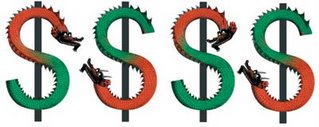
There is irony in this. For further explanation of Chinas investment policies and the US foreign debt crisis see;New Asian Dragon; East Asia's Dollars
China Raises Red Flag On Dollar
Americans may be spending their dollars with merry abandon as the Christmas shopping season begins this Black Friday, and that might be a good short-term strategy: the greenback slid on the foreign exchange markets after a Chinese central banker expressed fears about depreciation of the U.S. currency.
“The exchange rate of the U.S. dollar, which is the major reserve currency, is going lower, increasing the depreciation risk for East Asian reserve assets," wrote Wu Xiaoling, deputy governor of the People’s Bank of China, in an academic paper. Wu is ranked by Forbes as the 35th-most-powerful woman in the worldWu’s comments marked the second time this month that a Chinese central banker had made dollar-wary comments. On Nov. 9, the central bank governor, Zhou Xiaochuan, was quoted as saying that China has plans to diversify its assets into “many instruments,” presumably moving away from the dollar.
China has never revealed the exact composition of its foreign currency reserves, but market speculation suggests at least 70% is in dollars. With Chinese reserves having recently topped $1 trillion, a move away from the dollar could have significant implications.
For months China has been soaking up U.S. Treasury bonds, using dollars from its huge trade surplus with the United States. Wu noted that East Asian investors not only face a currency depreciation risk from holding dollar-denominated assets but also falling interest rates on long-term bonds. There is some perhaps unintentional irony in that comment because China’s seemingly insatiable appetite for Treasuries seems to be a major cause of the falling interest rates.
See:China
Find blog posts, photos, events and more off-site about:
China, Amercia, currency, inflation, TreasuryBonds, debt, US, US-foreign-debt, dollar, interest,